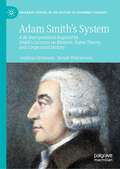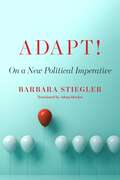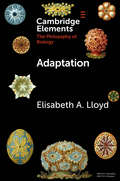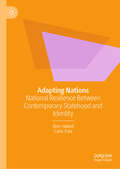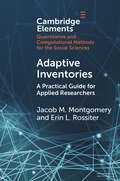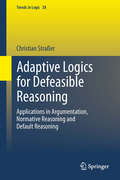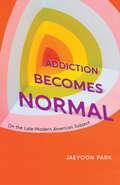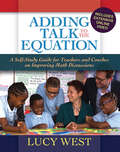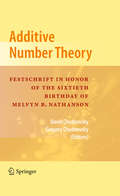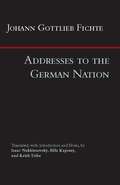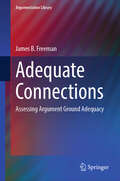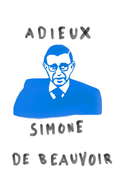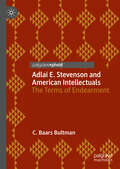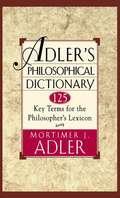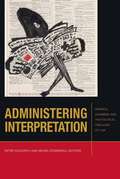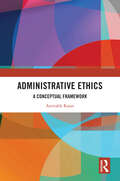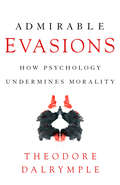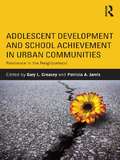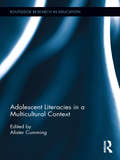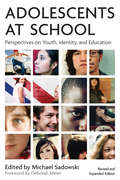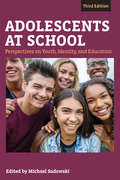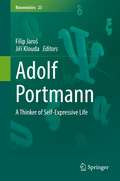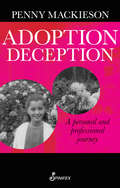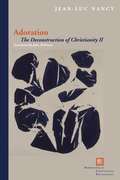- Table View
- List View
Adam Smith’s System: A Re-Interpretation Inspired by Smith's Lectures on Rhetoric, Game Theory, and Conjectural History (Palgrave Studies in the History of Economic Thought)
by Andreas Ortmann Benoît WalraevensInspired by his lectures on rhetoric and by game theory, this book provides a new interpretation of Adam Smith’s system of thought. It highlights its coherence through the identification of three reasoning routines and a meta-reasoning routine throughout his work on languages, rhetoric, moral sentiments, self-command, and the nature and causes of the wealth of nations. The identification of these reasoning routines allows the authors to uncover a hitherto poorly understood deep structure of Smith’s work and to explain its main characteristics. How these routines emerged in Smith’s early research on the principles of the human mind is also traced. This book sheds new light on Adam Smith and his work, highlighting his sophisticated understanding of strategic interaction in all things rhetorical, moral, and economic. It will be relevant to students and researchers interested in the history of ideas, the history of economic thought, game theory, Enlightenment studies, and rhetoric.
Adapt!: On a New Political Imperative
by Barbara StieglerWinner, French Voices AwardThis book, a crossover hit in France, offers a fresh genealogy of our neoliberal moment.“We must adapt!” These words can be heard almost everywhere and in every aspect of our lives. Where does this widespread sense that we have fallen behind come from? How can we explain this progressive colonization of the economic, social, and political fields by this biological vocabulary of evolution? Offering a lucid account of sophisticated material, Barbara Stiegler uncovers the prehistories of today’s ubiquitous rhetoric in Darwinism and American liberalism, while, at the same time, recovering powerful resistances to the rhetoric of adaptation across the twentieth century.Walter Lippmann, an American theorist of this new liberalism, believed democracy was not adapted to the needs of globalization. Only a government of experts could force society to evolve, he argued. Lippmann thus found himself confronted with John Dewey, the great figure of American Pragmatism. Both Lippmann and Dewey labored under the impression that the world had changed and society needed to adapt. However, Lippmann did not trust society to adapt on its own and insisted on the need for experts who would force the necessary adaptation. Dewey, by contrast, believed the necessary adaptation could only come "from below" and should proceed in a democratic fashion. Focusing on readings of Michel Foucault, Walter Lippmann, and John Dewey, Adapt! paves the way for renewed insights into neoliberalism’s history, essence, characteristic forces, and impacts, as well as biopolitical theory. Stiegler presents an intriguing new genealogy for the development of neoliberalism, examining whether humans are by nature lagging and require biopolitical and disciplinary management to enforce adaptation. Stiegler also reorients Foucault’s genealogy of neoliberalism by emphasizing the Darwinian rhetoric of adaptation, as it arose in the Lippmann–Dewey Debate, and deftly handles the question of human nature in a way that re-enlivens this traditional concept. As the industrialization of our ways of life never stops destroying the environment and the health of organisms (climate disruption, the destruction of biodiversity, the growth of chronic diseases, the return of large pandemics), how can we think of a democratic government of life and the living? This is the question that Stiegler’s work helps us to confront.
Adaptation (Elements in the Philosophy of Biology)
by Elisabeth LloydNatural selection causes adaptation, the fit between an organism and its environment. For example, the white and grey coloration of snowy owls living and breeding around the Arctic Circle provides camouflage from both predators and prey. In this Element, we explore a variety of such outcomes of the evolutionary process, including both adaptations and alternatives to adaptations, such as nonadaptive traits inherited from ancestors. We also explore how the concept of adaptation is used in evolutionary psychology and in animal behavior, and the adequacy of methods used to confirm evolutionary accounts of human traits and behaviors.
Adapting Nations: National Resilience Between Contemporary Statehood and Identity
by Carlo Pala Alon HelledNations adapt. Nations are resilient both within and outside the boundaries of statehood. Yet scholarship tends to downplay nationhood, as it focuses on the polity. As a consequence, the investigation of modern societies, though usually articulated around the nation-state model, falls into state-centrism, whilst neglecting the other side of the coin. This book initiates an interdisciplinary debate that encourages research in a field that has largely been overlooked in European social and political sciences. The analysis, offered by the authors, reinstates the concept of the 'nation' beyond the traditional, and somewhat dichotomous, schools of thought, hence neither judging the nation as a mere invention nor as a deterministic product of history. The book provides those interested in nationalism with new approaches to exploring national identity and its connection to statehood. By using concepts inspired by political science and sociology, namely habitus, survival unit, polity, hysteresis, and so forth, the different chapters of the volume revitalise the inquiry of the dimensions and features in which the nation and the identification they engender become tools of adaptation in relation to the transformative reality of our own contemporaneity. The authors thus contextualise the latter via the mid-range concept of national resilience at both meso- and macro-levels.
Adaptive Inventories: A Practical Guide for Applied Researchers (Elements in Quantitative and Computational Methods for the Social Sciences)
by Jacob M. Montgomery Erin L. RossiterThe goal of this Element is to provide a detailed introduction to adaptive inventories, an approach to making surveys adjust to respondents' answers dynamically. This method can help survey researchers measure important latent traits or attitudes accurately while minimizing the number of questions respondents must answer. The Element provides both a theoretical overview of the method and a suite of tools and tricks for integrating it into the normal survey process. It also provides practical advice and direction on how to calibrate, evaluate, and field adaptive batteries using example batteries that measure variety of latent traits of interest to survey researchers across the social sciences.
Adaptive Logics for Defeasible Reasoning: Applications in Argumentation, Normative Reasoning and Default Reasoning (Trends in Logic #38)
by Christian StraßerThis book presents adaptive logics as an intuitive and powerful framework for modeling defeasible reasoning. It examines various contexts in which defeasible reasoning is useful and offers a compact introduction into adaptive logics. The author first familiarizes readers with defeasible reasoning, the adaptive logics framework, combinations of adaptive logics, and a range of useful meta-theoretic properties. He then offers a systematic study of adaptive logics based on various applications. The book presents formal models for defeasible reasoning stemming from different contexts, such as default reasoning, argumentation, and normative reasoning. It highlights various meta-theoretic advantages of adaptive logics over other logics or logical frameworks that model defeasible reasoning. In this way the book substantiates the status of adaptive logics as a generic formal framework for defeasible reasoning.
Addiction Becomes Normal: On the Late-Modern American Subject
by Jaeyoon ParkAddiction is now seen as an ordinary feature of human nature, an idea that introduces new doubts about the meaning of our desires. Over the last forty years, a variety of developments in American science, politics, and culture have reimagined addiction in their own ways, but they share an important understanding: increasingly, addiction is described as normal, the natural result of a body that has been exposed to potent stimuli. This shift in thinking suggests that addiction is a condition latent in all of us, a common response to a society rich in thrills. In Addiction Becomes Normal, Jaeyoon Park provides a history and critical analysis of the normalization of addiction in late-modern American society. By exploring addiction science, diagnostic manuals, judicial reform, and public health policy, he shows how seeing addiction as normal has flourished in recent decades and is supported throughout cultural life in the United States by the language of wellness, psychotherapy, and more. Building on Michel Foucault’s depiction of the human figure, Park argues that this shift reflects the emergence of a new American subject, one formed by the accretion of experiences. This view of the human subject challenges the idea that our compulsions reflect our characters, wills, or spirits. For if addiction is an extreme but ordinary attachment, and if compulsive consumption resembles healthy behavior, then desire is no longer an expression of the soul so much as the pursuit of a past reward. A perceptive work of recent history and political theory, Addiction Becomes Normal raises new questions about what it means to be human in America today.
Adding Talk To The Equation: A Self-Study Guide for Teachers and Coaches on Improving Math Discussions
by Lucy WestFor more than 20 years, Lucy West has been studying mathematical classroom discourse. She believes that teachers need to understand what their students are thinking as they grapple with rich mathematical tasks and that the best way to do so is through talking and listening. In this video-rich edition of Adding Talk to the Equation: Discussions and Discovery in Mathematics, she invites teachers into real-life classrooms where all students stay in the game, stay motivated about learning, and ultimately deepen their understanding. Designed for math teachers and coaches in grades 18, this self-study guide showcases elementary and middle school classrooms where teachers inspire even the most reluctant students to share their ideas. Through the stories of skilled teachers, West offers play-by-play commentary as they get more comfortable with new talk moves and learn to tune in and respond to students' math conversations. Although these discussions occur in math class, the strategies can be used to create a respectful, productive environment for any subject area. This video-based resource examines the importance of creating a safe learning environment; the value of thinking, reasoning, and questioning; the role of active, accountable listening; and the necessity of giving all students a you can do this message. West also emphasizes that slowing down, even in the face of time constraints, is crucial for creating a classroom where all students feel they have something to contribute. This guide includes transcripts of the case studies, with insightful commentary from West that gives you a window into her thinking and the complexities of the work she is doing with teachers, as well as her reflections on missed opportunities.
Additive Number Theory: Festschrift In Honor of the Sixtieth Birthday of Melvyn B. Nathanson
by David Chudnovsky Gregory ChudnovskyThis impressive volume is dedicated to Mel Nathanson, a leading authoritative expert for several decades in the area of combinatorial and additive number theory. For several decades, Mel Nathanson's seminal ideas and results in combinatorial and additive number theory have influenced graduate students and researchers alike. The invited survey articles in this volume reflect the work of distinguished mathematicians in number theory, and represent a wide range of important topics in current research.
Addresses to the German Nation
by Keith Tribe Isaac Nakhimovsky Bela Kapossy Johann Gottlieb FichteIn the winter of 1807, while Berlin was occupied by French troops, the philosopher Johann Gottlieb Fichte presented fourteen public lectures that have long been studied as a major statement of modern nationalism. Yet Fichte's Addresses to the German Nation have also been interpreted by many as a vision of a cosmopolitan alternative to nationalism.This new edition of the Addresses is designed to make Fichte's arguments more accessible to English-speaking readers. The clear, readable, and reliable translation is accompanied by a chronology of the events surrounding Fichte's life, suggestions for further reading, and an index. The groundbreaking introductory essay situates Fichte's theory of the nation state in the history of modern political thought. It provides historians, political theorists, and other students of nationalism with a fresh perspective for considering the interface between cosmopolitanism and republicanism, patriotism and nationalism.
Adequate Connections: Assessing Argument Ground Adequacy (Argumentation Library #38)
by James B. FreemanThis book presents a comprehensive picture of when the premises of an argument are adequately connected to its conclusion. The author draws upon the familiar Toulmin model, Rescher’s discussion of presumption and burden of proof, and L. Jonathan Cohen’s presentation of the method of relevant variables. The book first assesses the warrant or inference rule connecting the premises to the conclusion. To analyzes this, the author asks a series of questions such as - should the warrant be evaluated by conclusive or defeasible standards? Does the argument require that its premises, if acceptable, guarantee that the conclusion is acceptable also or does it allow the premises just to present a body of relevant evidence? Is the inference rule backed or supported a priori or a posteriori? These distinctions form four categories of warrants: conclusive a priori, defeasible a posteriori, defeasible a priori, and virtually conclusive a posteriori. The warrants in each category are evaluated differently for how strongly the premises support the conclusion of arguments instancing those warrants. After presenting the rationale for this division and discussing our nonprobabilistic approach, the author analyzes the connection adequacy for each of these types of warrants. This book is of interest to scholars of argumentation theory.
Adieux
by Simone De BeauvoirSimone de Beauvoir's account of the last ten years of Jean-Paul Sartre's life provides a focus for understanding one of the greatest thinkers of the twentieth century. But the book, consisting of both a year-by-year account of Sartre's last decade and a conversation between him and de Beauvoir about his life and work, is more than just a philosophical examination. It is also a personal dialogue of astonishing frankness that illuminates one of the most famous and complex relationships of the twentieth century.From the Trade Paperback edition.
Adlai E. Stevenson and American Intellectuals: The Terms of Endearment
by C. Baars BultmanThis book focuses on a biographical and cultural rendering of Adlai E. Stevenson's alliance with a segment of the intellectual community, with primary attention to the years from 1940 to his death in 1965. At the core of the study is an evaluation of the nature of a relationship that was important both to intellectuals, particularly literary intellectuals, and to Stevenson. This volume exhibits case studies which illumine the alliance through a view of Stevenson's relations with American writers Archibald MacLeish and John Steinbeck.
Adler's Philosophical Dictionary
by Mortimer J. AdlerThe terms and concepts that have simulated thinkers from Aristotle onward come to life in the latest work by the man TIME magazine has called "America's philosopher for everyman". Is the human soul immortal? What does it mean to know something? What is the nature of erotic love? Adler examines these questions as well as many others with his trademark clarity, rigor, and common sense.
Administering Interpretation: Derrida, Agamben, and the Political Theology of Law (Just Ideas)
by Peter Goodrich and Michel RosenfeldPopulism in politics and policy orientations in law have thrown the jurisdiction of the academy and the disciplines of interpretation into disarray. Critique flounders in abstraction and negativity, law loses itself in particularity. Administering Interpretation brings together philosophers, humanists, and jurists from both continental and Anglophone jurisdictions to reassess the status and trajectory of interpretative theory as applied in the art of law. Tracking the thread of philosophical influences upon the community of legal interpretation, the essays move from the translation and wake of Derrida to the work of Agamben, from deconstruction to oikononmia. Sharing roots in the philological excavation of the political theology of modern law, contributors assess the failure of secularism and the continuing theological borrowings of juridical interpretation. The book brings contemporary critique to bear upon the interpretative apparatuses of exclusion, the law of spectacular sovereignty, and the bodies that lie in its wake.Contributors: Giovanna Borradori, Marinos Diamantides, Allen Feldman, Stanley Fish, Pierre Legrand, Bernadette Meyler, Michel Rosenfeld, Bernhard Schlink, Jeanne Schroeder, Laurent de Sutter, Katrin Trüstedt, Marco Wan
Administrative Ethics: A Conceptual Framework
by Amitabh RajanThis insightful book explores the use and application of ethics in contemporary governance and suggests necessary reforms. Following an interdisciplinary approach involving the fields of political science, law, economics, sociology, management, and philosophy, this book analyses their applicability and usefulness in everyday practices in governance, covering its five cardinal virtues—prudence, transparency, discourse, justice, and accountability. Highlighting ethical challenges in aspects of status recognition, oppression, empowerment, social care, public financing, environment protection and others in today’s interconnected world, it delves into the dynamics of administrative power in democracies and showcases how the misuse of power can be controlled through a discourse of ethics in law and governance. The book will be useful to the students, researchers and teachers of public administration, philosophy, political Science, corporate ethics, and governance other related social sciences disciplines. The book will also be an indispensable companion to social activists, advocacy groups, journalists and civil society institutions and public service training institutions.
Admirable Evasions
by Theodore DalrympleIn Admirable Evasions, Theodore Dalrymple explains why human self-understanding has not been bettered by the false promises of the different schools of psychological thought. Most psychological explanations of human behavior are not only ludicrously inadequate oversimplifications, argues Dalrymple, they are socially harmful in that they allow those who believe in them to evade personal responsibility for their actions and to put the blame on a multitude of scapegoats: on their childhood, their genes, their neurochemistry, even on evolutionary pressures.Dalrymple reveals how the fashionable schools of psychoanalysis, behaviorism, modern neuroscience, and evolutionary psychology all prevent the kind of honest self-examination that is necessary to the formation of human character. Instead, they promote self-obsession without self-examination, and the gross overuse of medicines that affect the mind.Admirable Evasions also considers metaphysical objections to the assumptions of psychology, and suggests that literature is a far more illuminating window into the human condition than psychology could ever hope to be.
Adolescent Development and School Achievement in Urban Communities: Resilience in the Neighborhood
by Patricia A. Jarvis Gary L. CreaseyThis timely volume explores essential themes, issues, and challenges related to adolescents’ lives and learning in underserviced urban areas. Distinguished scholars provide theoretically grounded, multidisciplinary perspectives on contexts and forces that influence adolescent development and achievement. The emphasis is on what is positive and effective, what can make a real difference in the lives and life chances for urban youths, rather than deficits and negative dysfunction. Going beyond solely traditional psychological theories, a strong conceptual framework addressing four domains for understanding adolescent development undergirds the volume: developmental continuities from childhood primary changes (biological, cognitive, social) contexts of development adolescent outcomes. A major federal government initiative is the development of programs to support underserviced urban areas. Directly relevant to this initiative, this volume contributes significantly to gaining a realistic understanding of the contexts and institutions within which urban youths live and learn.
Adolescent Literacies in a Multicultural Context (Routledge Research in Education)
by Alister CummingThis book presents results from a four-year project addressing the central question: What factors, challenges, and contexts contribute to and constrain literacy achievement among at-risk adolescent learners with culturally diverse backgrounds? Researchers consider the importance of several, interrelated factors that support the development of adolescents’ literacies in multilingual contexts: support from educators, community groups, families, and peers; recognition of the multi-faceted complexity of literacy through multiple, complementary methods of research and assessment; approaches to pedagogy that engage learners’ zones of proximal development in humanistic and purposeful ways; and promoting students’ vocabulary knowledge, strategies for reading, writing, and learning, and orientations to engaging with epistemic purposes of literacy critically, through multiple media, and with self-confidence.
Adolescents at School, Second Edition: Perspectives on Youth, Identity, and Education (Youth Development And Education Ser.)
by Michael SadowskiAs any teacher or parent knows, adolescence is a time when youth grapple with the question, &“Who am I?&” Issues of race, ethnicity, class, gender, sexual orientation, and ability can complicate this question for young people, affecting their schoolwork and their relationships with teachers, family, and peers. This new edition of Adolescents at School builds and expands the strengths and insights of the much-acclaimed first edition. Drawing from the perspectives of teachers, researchers, and administrators—and adolescents themselves—it examines the complex, changing identities young people manage while they confront the challenges of schools. A uniquely practical, insightful, and jargon-free volume, Adolescents at School points to ways to foster the success of every student in our schools and classrooms.
Adolescents at School, Third Edition: Perspectives on Youth, Identity, and Education (Youth Development and Education Series)
by Michael SadowskiAdolescents at School brings together the perspectives of scholars, educators, and researchers to address the many issues that affect adolescents&’ emerging identities, especially in relation to students&’ experience of and engagement with school. The book offers current and preservice teachers a practical understanding of the concept of identity development, particularly as impacted by such factors as race, ethnicity, gender, sexual orientation, ability/disability, immigration, and social class. This third edition includes new chapters on boys&’ emotional lives, risk and resilience in girls, the experiences of undocumented immigrant students, Muslim-American youth, and income inequality; features on &“teaching while white&”; and an extensively updated chapter on LGBTQ+ students. The book expands on the strengths and insights of the previous editions while also touching on issues highly relevant to contemporary youth such as social media, youth activism, and immigration. A practical and insightful volume, Adolescents at School points to ways to foster the success of every student in our schools and classrooms.
Adolescents at School: Perspectives on Youth, Identity, and Education
by Deborah Meier Michael SadowskiAs any teacher or parent knows, adolescence is a time when youth grapple with the question, “Who am I?” Issues of race, ethnicity, class, gender, sexual orientation, and ability can complicate this question for young people, affecting their schoolwork and their relationships with teachers, family, and peers. This new edition of Adolescents at School builds and expands the strengths and insights of the much-acclaimed first edition. Drawing from the perspectives of teachers, researchers, and administrators—and adolescents themselves—it examines the complex, changing identities young people manage while they confront the challenges of schools. A uniquely practical, insightful, and jargon-free volume, Adolescents at School points to ways to foster the success of every student in our schools and classrooms.
Adolf Portmann: A Thinker of Self-Expressive Life (Biosemiotics #23)
by Filip Jaroš Jiří KloudaThis edited volume is the first specialized book in English about the Swiss zoologist and anthropologist Adolf Portmann (1897-1982). It provides a clarification and update of Portmann’s theoretical approach to the phenomenon of life, characterized by terms such as “inwardness” and “self-presentation.” Portmann’s concepts of secondary altriciality and the social uterus have become foundational in philosophical anthropology, providing a benchmark of the difference between humans and animals. In its content, this book brings together two approaches: historical and philosophical analysis of Portmann’s studies in the life sciences and application of Portmann’s thought in the fields of biology, anthropology, and biosemiotics. Significant attention is also paid to the methodological implications of his intended reform of biology. Besides contributions from contemporary biologists, philosophers, and historians of science, this volume also includes a translation of an original essay by Portmann and a previously unpublished manuscript from his most remarkable English-speaking interpreter, philosopher Marjorie Grene. Portmann’s conception of life is unique in its focus on the phenomenal appearance of organisms. Confronted with the enormous amount of scientific knowledge being produced today, it is even clearer than it was during Portmann’s lifetime that although biologists employ physical and chemical methods, biology itself is not (only) physics and chemistry. These exact methods must be applied according to what has meaning for living beings. If biology seeks to understand organisms as autonomous agents, it needs to take display and the interpretation of appearances as basic characteristics of life. The topic of this book is significantly relevant to the disciplines of theoretical biology, philosophy, philosophical anthropology, and biosemiotics. The recent epigenetic turn in biology, acknowledging the interconnections between organismal development, morphology and communication, presents an opportunity to revisit Portmann’s work and to reconsider and update his primary ideas in the contemporary context.
Adoption Deception: A Personal and Professional Journey
by Penny MackiesonHave you ever wondered how it might feel to have been adopted in Australia during the pre-1980s era in which vulnerable young mothers were coerced into relinquishing their babies? How it might feel to have grown up, become a social worker and worked with vulnerable children and families? This book provides answers to those difficult questions. Adoption Deception presents the personal and professional reflections of Penny Mackieson, an Australian adoptee and social worker, on issues associated with adoption - many of which are shared with donor conception and surrogacy. For anyone with an experience of or interest in adoption, whether personal or professional, who is open to perspectives other than those selectively portrayed by populist mainstream media, this book will provide invaluable insights.
Adoration: The Deconstruction of Christianity II (Perspectives in Continental Philosophy)
by Jean-Luc NancyThis second volume in Nancy’s The Deconstruction of Christianity explores the stance or bearing that would be appropriate for us now, in the wake of the dis-enclosure of religion and the retreat of God: that of adoration. Adoration is stretched out toward things, but without phenomenological intention. In our present historical time, we have come to see relation itself as the divine. The address and exclamation--the salut!--that constitutes adoration celebrates this relation: both the relation among all beings that the world is and what is beyond relation, the outside of the world that opens us in the midst of the world.A major contribution to the contemporary philosophy of religion, Adoration clarifies and builds upon not only Dis-Enclosure, the first volume in this project, but also Nancy’s other previous writings on sense, the world, and the singular plurality of being.
